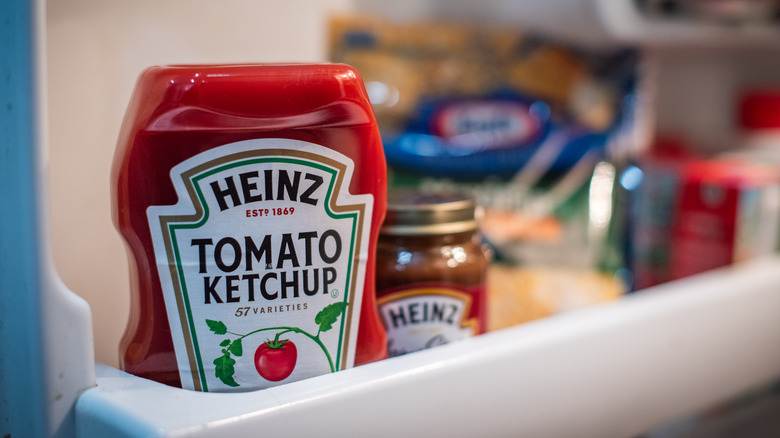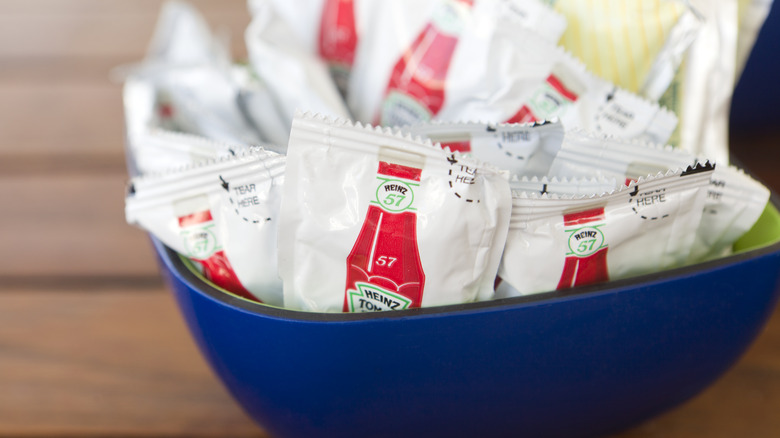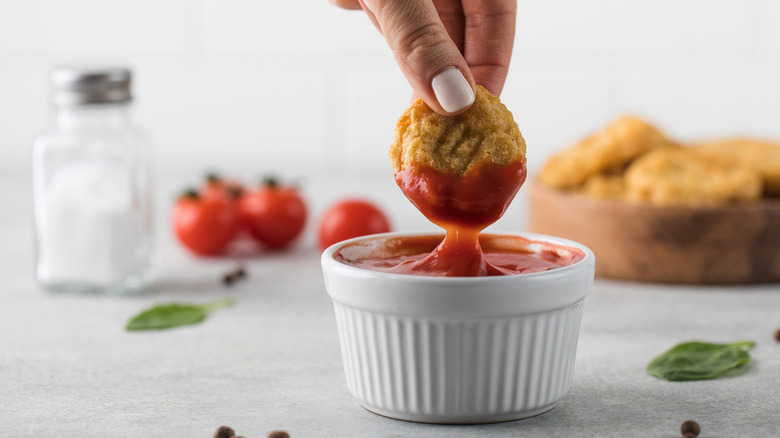Do You Actually Need To Refrigerate Ketchup?
Ketchup is a delectably sweet and tangy condiment, making the perfect embellishment for salty and savory foods. It is also a versatile product and among our ten best pantry staples for cleaning your kitchen. Nonetheless, ketchup is a confusing condiment when it comes to storage. You might store it in the refrigerator at home, but you'll also see bottles left on the tables at restaurants, in a pile of packets by the napkins at a fast food joint, and lined up on the shelf in the condiment aisle at grocery stores. With all the room-temperature spots you can find ketchup, the question must be raised: Does ketchup need to be refrigerated at all?
The answer is not a matter of food safety but rather lifespan maximization. If you are among the ketchup-crazed community, you may be less concerned with extending the shelf-life of your ketchup and more concerned with not finishing the whole bottle in one go. If, however, it takes you time to work through a bottle, storing your ketchup in the fridge is a good way to keep it fresh.
Scoping out the safety of ketchup storage
Since ketchup contains vinegar, an acidic ingredient, it is considered shelf stable, which is why ketchup can sit at room temperature for extended periods. Upon initial opening, as long as the bottle or jar remains shut most of the time, room-temperature ketchup will remain safe to eat.
Still, like many other condiments, storing ketchup in the fridge is the best way to preserve it. As Food safety specialist Martin Bucknavage explained to The Guardian, "If you want to maximize the quality of your ketchup, you keep it in the fridge. He went on to point out that, "Once you open up ketchup, there is the potential for mold to get into the top, which is the biggest concern if the product is left out for an extended period of time." As with any food, the quality and flavor of ketchup will begin to degrade upon breaking the product seal, and refrigeration slows this process down.
The hot and cold takes of ketchup consumers
Beyond the principle of preservation, ketchup's storage environment will impact its flavor and texture. Keeping ketchup in the fridge helps prevent its components from separating. When you squeeze ketchup from a bottle sitting at room temperature, you will notice that a thin, reddish liquid will squirt out first. You can reintegrate the ketchup's components by shaking up the bottle or massaging the packet, but the best way to avoid a ketchup-water incident is to keep it chilled.
As for temperature, some swear by cold ketchup, while others will happily opt for it at room temperature. Renowned condiment company Heinz took to Twitter to share its take on the controversial matter, stating: "FYI: Ketchup. goes. in. the. fridge!!!"
FYI: Ketchup. goes. in. the. fridge!!!
— Heinz (@HeinzUK) June 27, 2023
Users responded with their preferences, commenting, "Cold sauce on hot food? No" and "It tastes better cold!" There has yet to be a consensus on the issue taste-wise. Safety-wise, though, ketchup at room temperature will not pose an imminent threat, and refrigerating or not refrigerating mostly comes down to preference.


